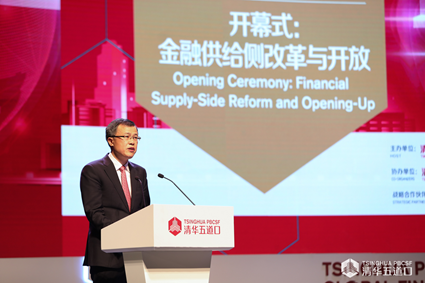
XIAO Yuanqi Chief Risk Officer, Director-General of the General Office and Spokesperson of China Banking and Insurance Regulatory Commission
In remarks at the 5th annual Tsinghua PBCSF Global Finance Forum, GUO Shuqing, Chairmam of China Banking and Insurance Regulatory Commission (CBRC) indicated that the current trade frictions between the US and China is currently not solving any problems between the two countries and in fact it is having a limited impact on the Chinese economy. He indicated, however, there is a role for the financial services to play in the continued opening up despite pressure from abroad.
China-US Trade War
With the ongoing trade dispute with the US as a result of what the US has called “unfair trade practices” the US has imposed successive rounds of tariffs on up to US$200 billion of Chinese imported goods. Guo Shuqing indicated that while China has exported large volumes of goods to the US in the past, the export goods are fit for US domestic consumptions. To further lessen the impact of the Sino-US trade war, many US importers have shown willingness to share the cost of the increased tax burden to import Chinese goods.
The US has also benefited from its large deficit position, such as Walmart corporation with 26 percent of its purchases from China. The increasing trade tensions also has negative impacts on the well-being of US consumers and households.
Based on world and market demand for RMB, efforts are being made to move forward with an RMB reform process, however, it must be noted that past RMB fluctuation was largely the result of external factors such as the recent increase in tariffs on Chinese goods by the US which caused a depreciation in RMB.
Blaming China for stealing technology is modern power politics logic
In his speech, Guo emphasized that blaming China for 'stealing technology' is modern power politics logic.
China started attracting foreign investment 40 years ago where foreign investors has gained huge profits. 2 trillion dollars was actually used, among which FDI from US against China is 80 billion. The asset formed is 1.5 trillion. All the transaction are built on mutual benefits, none of which is forced by Chinese government. Accusing China for "compulsory acquisition of intellectual property rights", or even "stealing", is an insult to China.
Role of Financial Services Supply-Side in Opening up
In the financial services sector, there is continued growth and diversification with pivate banks being privately owned. This financial openness due to prudent and inclusive regulations have resulted in the growth of agencies such as Alipay to grow into a major player and has spawned new businesses.
Along with the continued growth in the financial services, there is the need for strong corporate governance. This requires an alignment of the current practices with global best practices in the industry. While the current China model for banks does allow a role for the party in management, there is independence and separation or roles and duties with the Board of Directors of such banks retaining responsibility for business decisions. This China model for banking has a demonstrated and proven track record of growth for banks in China, several who which have received international awards.
This year there are 12 initiatives to further open the Chinese market which are hoped to bring welcome investment in health care and more finance firms to the market. However, with opening up comes greater risk and there is a need for increase regulations, a task that will be managed in response to Chinese market forces.
The goals of increased regulation and surveillance are many, however, it is recognized that pollution control and environmental protection is one area for improvement. Greater legal measures are needed to enforce pollution control. Concerns have also arisen with respect to Chinas ageing population and labor force. This in tandem with poverty issues and population losses in rural communities pose great challenges.
One way to address these challenges is to solve the problem of the "lack of innovation". According to Mr. Guo, this the area where financial services can provide the greatest amount of help by providing support to innovative products.